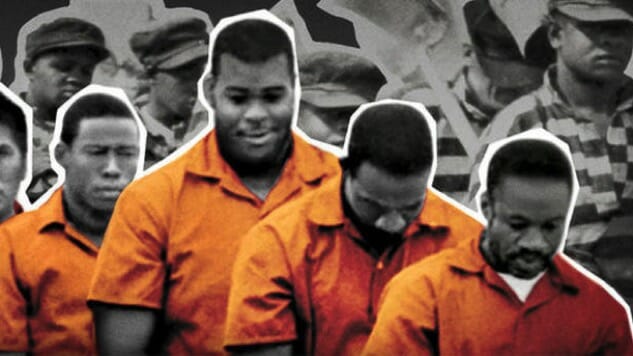13th

Director Ava DuVernay has successfully made a documentary that challenges and even dismantles our collective understanding of one of the most dangerous notions of our time: “progress.” How do we define progress, and who precisely gets to define it? 13th, now streaming on Netflix, is a captivating argument against those who measure progress with laws that pretend to protect American citizens and amendments, and even to uphold the Constitution. It is a deftly woven and defiant look at how clauses within those amendments (specifically the lauded 13th) and the language of our political system both veil and reveal a profound and devastating truth about America: Slavery was never abolished here, DuVernay and the participants in the film argue. It was simply amended, and it continues to be amended in 2016, with the constant evolution of the criminal justice system. It’s a bold and terrifying statement to make, but in using a documentary instead of, say, a narrative film, DuVernay is able to point directly to that history and to those people who have defined “progress” for black Americans. In doing so, she draws a line directly from the 13th amendment, to today’s America, which has the highest rate of incarceration in the world.
One of the most chilling quotes in the documentary comes from Glenn Martin, who declares that “systems of oppression are durable, and they tend to reinvent themselves.” 13th defines slavery and the Jim Crow era as systems of oppression that sought to control, destroy and disenfranchise black bodies and minds in America. Understood this way, there’s little surprise that such systems evolved to create America today, which is now largely defined by its prison population, which itself is largely defined by the disproportionate number of black male and female inmates. DuVernay is joined by scholars including Michelle Alexander, Jelani Cobb, Henry Louis Gates Jr. and many others who argue that the system is not broken; rather, it operates precisely as it has always meant to operate.
13th is an unusual film because it also works as a critique of language itself, where language serves as a system of oppression, or at least, as a contributor to systems of oppression. This clause of the 13th amendment is made up of mere words on a document, which has since determined the lives and deaths of countless black people, supposedly “freed” by the amendment itself. Similarly, 13th presents a powerful case against the word “criminal” which has always been closely connected to black people, especially men. Since the days of the original Birth of a Nation, America has been committed to assigning black men an inherent criminality—thieves and rapists (although, as one scholar points out, white men in America hold the record for interracial rape—a point immediately highlighted with a brief, horrifying clip of Michael Fassbender’s character raping Lupita Nyong’o’s Patsy in 12 Years a Slave). As long as black lives are associated with criminality, it makes sense to much of white America—and, perhaps even more devastatingly, to much of black America—that such lives be caged and struck down. Much like Ken Burns’ Central Park Five and on a much broader scope, 13th shows us how little perspectives have changed. Only our language, perhaps, has “evolved,” but it seems that evolution has only worked to mask many of the underlying truths. 13th reminds us of the time when Donald Trump took out a full page ad in 1989, calling for the death penalty for the five young black teens (later proven innocent). There’s the suggestion that what Trump was really calling for was a lynching, but with language modified for the times. (And isn’t that, in many ways, what he and much of white America got?)
A director with less nuanced sensibilities might have used such an opportunity to highlight Trump’s rise, but DuVernay resists the easy way out. While there is a brilliant montage aligning Trump’s calls to violence against protestors with iconic and still devastating images from the Civil Rights movement, Trump is not the shocking caricature many of us see on TV, in presidential debates and in headlines today. In 13th, Trump is not a monster, or a descendant of Adolf Hitler. Rather, he’s an American, and a descendant of Richard Nixon and Ronald Reagan. DuVernay’s film argues that his remarks about beating up protestors are no more terrifying than Hillary Clinton’s embrace of the racist “superpredator” term. Indeed, if there is one “monster” of the film, it’s probably the organization Alec, whose role in the politics and profiteering of mass incarceration is more frightening than, yes, even a Trump presidency. But even this powerful organization is simply made up of Americans and defined by American history.
-

-

-

-

-

-

-

-

-

-

-

-

-

-

-

-

-

-

-

-

-

-

-

-

-

-

-

-

-

-

-

-

-

-

-

-

-

-

-

-








































